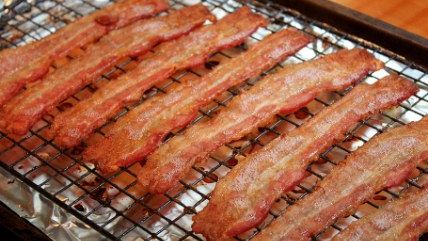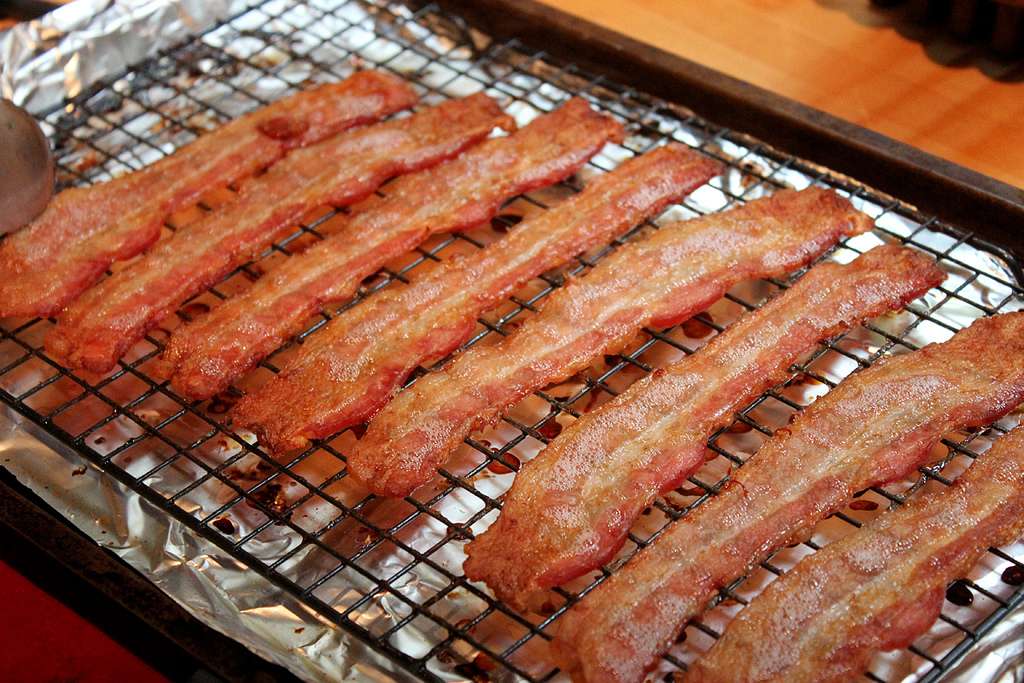Eat Food and Die
What happens when warnings about processed meat's cancer risk collides with California's absurd Prop 65 (over)warning law?


By now you've heard about a new World Health Organization report that links consumption of bacon, sausage, beef, and other meats to cancer.
Some early reports, based on the WHO classification, painted the connection between bacon and cancer as equivalent to that between cigarette smoking and cancer.
Many activists used the WHO announcement as cause to take a victory lap. #BanBacon, a subtle hashtag created earlier this year by the Physicians Committee for Responsible Medicine, a vegan group, got a new workout.
But the facts appear to be catching up to the frenzy.
"It is certainly very inappropriate to suggest that any adverse effect of bacon and sausages on the risk of bowel cancer is comparable to the dangers of tobacco smoke, which is loaded with known chemical carcinogens and increases the risk of lung cancer in cigarette smokers by around 20 fold," Dr. Ian Johnson of the Institute of Food Research told Britain's Telegraph.
Perspective like this helps. As others have noted, the increased risk associated with eating bacon and the other foods listed in the WHO report is scant—something along the lines of an increase of one percentage point (from five percent to six percent). The WHO itself clarified this point in the wake of the fatalistic headlines caused by its report.
The WHO report estimates that 34,000 out of 56 million annual deaths worldwide may be attributable to eating processed meats. That's 0.06 percent of all deaths worldwide.
The molehill of risk has real-world implications. In fact, it could lead to a mountain of regulations and litigation—beginning right here in America.
"Will the Golden State now require steaks, chops, and burgers to have such labels?" asked Reason's Ron Bailey last month, in the wake of the WHO report.
Sure enough, reports emerged last week that the report would spur a clash in California.
Why California? As Bailey and I feared, there's already talk of moving meat onto California's list of cancer-causing foods under the state's Proposition 65 law—a list that already includes some chicken, cereal, crackers, cookies, bread, French fries, and potato chips.
I was in Santa Monica last month and joked with colleagues about the Prop 65 warning that appeared right next to the entrance to the hotel. "Chemicals known to the state of California to cause cancer, or birth defects or other reproductive harm[,] may be present in foods or beverages sold here," the sign reads.
Which chemicals? Which foods? Who knows? While you'll see these signs at virtually ever grocer, corner store, and coffee shop in California, it's largely not because the warnings are necessary or meaningful but because the state—or even private individuals or their heroic lawyers—can sue those who fail to display these worthless signs.
The overwarning caused by Prop 65 in California, I've noted before, is as outrageous as it is unhelpful. It's as absurd as it is counterproductive. "The nation's breadbasket now wants us to fear bread," I wrote in a 2010 law-review article that focused in part on the idiocy of applying Prop 65 to food, something—as I also note in the article—that Prop 65 was never intended to do.
But perhaps the activists I noted earlier would be smart to look at the foods already on California's Prop 65 list, which includes several vegan offerings, including coffee, roasted asparagus, canned pumpkin, black olives, roasted nuts, and prune juice. The government says those vegan foods cause cancer. That's no reason for meat eaters to take a victory lap. Instead, it's another reason to question the ineffectiveness of Prop 65 and of hysterical reports masquerading as science.


Show Comments (27)